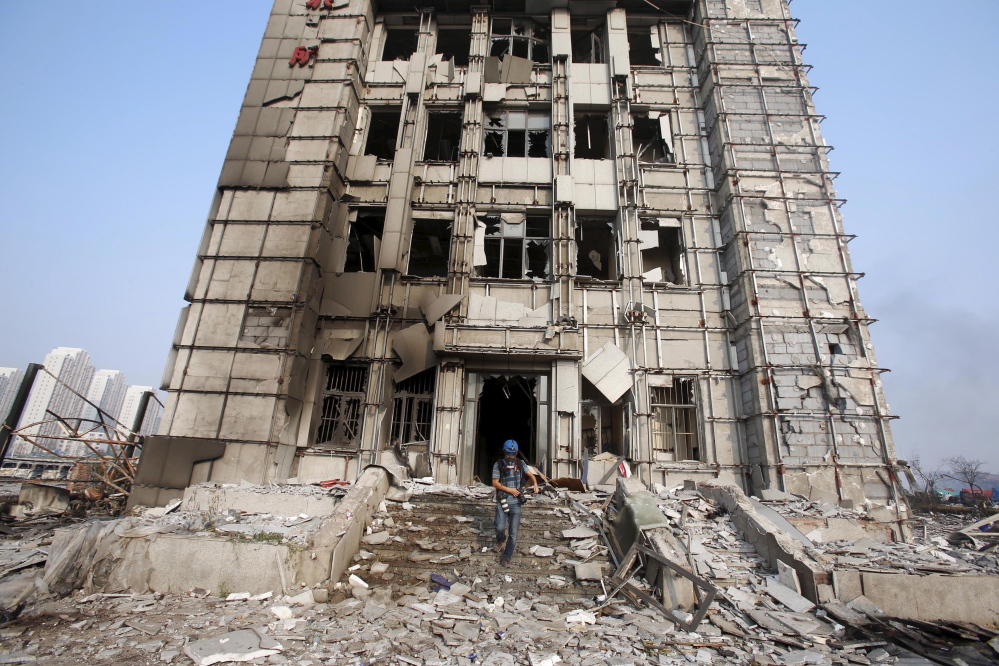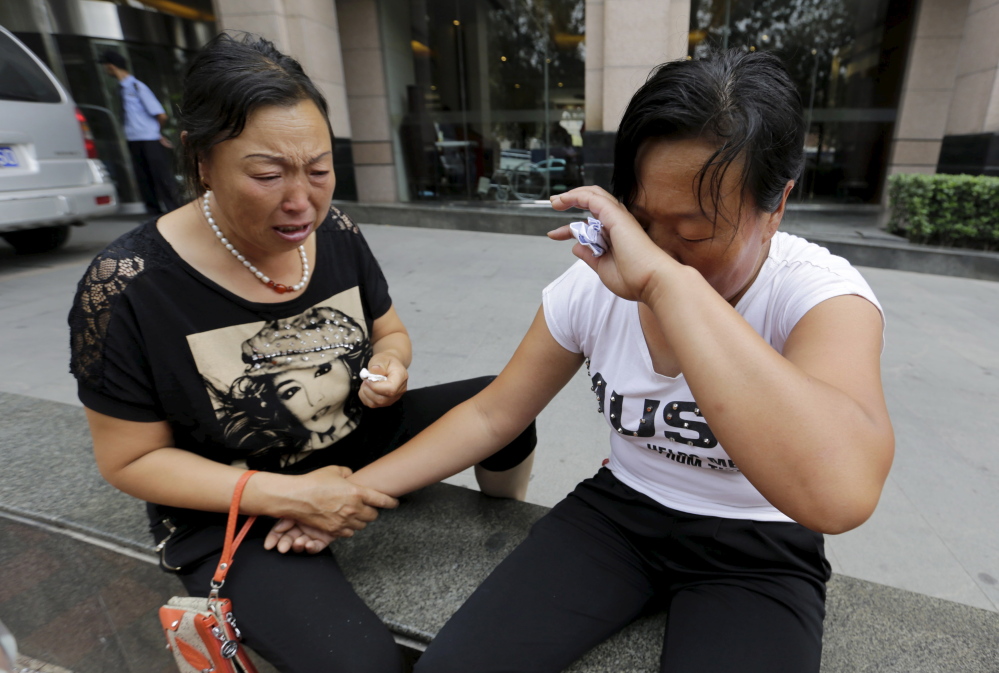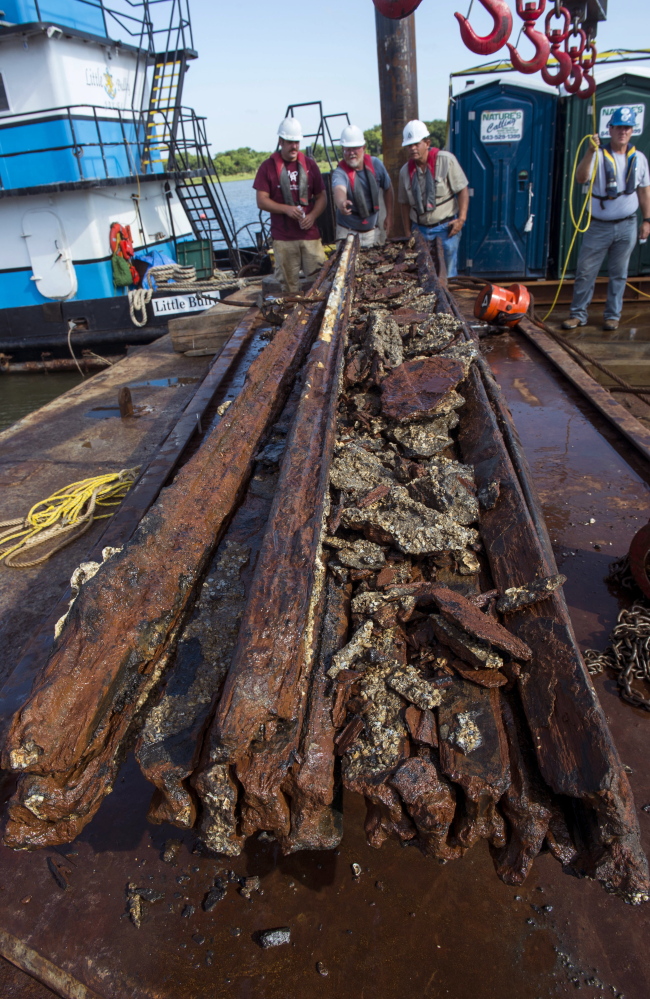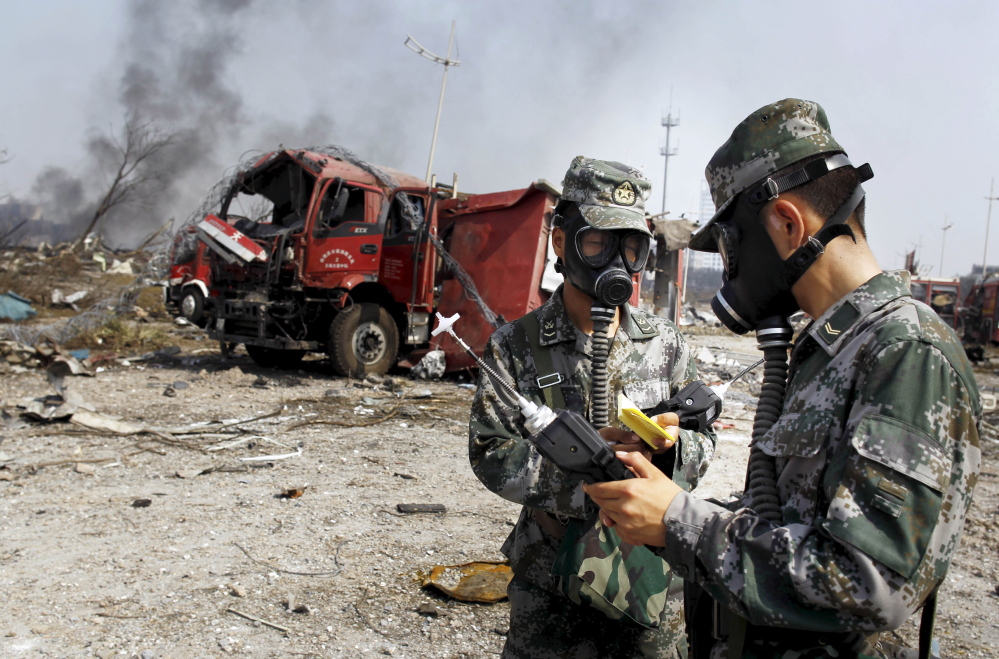TIANJIN, China — About 11 p.m. Wednesday, Zhang Deyong stood by his apartment’s 22nd story window and watched two huge fireballs ripple into the sky and then fade into an ominous mushroom cloud of smoke and debris.
He felt shock waves course through him, knocking him off balance. Then he fled, panicked, his wife and their 4-year-old daughter in tow.
Since then, the panic has not abated.
With nowhere else to go, the 35-year-old driver took his family to a makeshift refugee camp at the Tianjin Economic Development Area No. 2 Primary School, a slapdash collection of cots in muggy, tile-floored classrooms. He said he doesn’t know what to do next.
His parents’ home in central China’s Hubei province is far away. Train tickets are sold out, and flights are unaffordable. On Sunday afternoon, he still wore the shorts that he wore the night of the disaster. His daughter won’t stop crying. At night, his family is swarmed by clouds of mosquitoes, making sleep impossible.
“I can’t go home,” he said, choking back tears. “I can’t go home. I can’t go home.”
NIGHTMARE BEGINS
Tianjin, a northeastern Chinese city of 14 million only a short drive from Beijing, is still reeling days after an inferno at a warehouse containing hazardous chemicals precipitated two huge explosions, killing at least 112 people and hospitalizing more than 700. The blasts burned out buildings, incinerated cars and trucks, and shattered windows miles away.
At least 6,000 people lost their homes, at least temporarily, and for many of them, the nightmare is just beginning. Several said officials have given them no information on relocation, compensation or even the safety of returning for their belongings.
Authorities have sought to quell public anxiety: Premier Li Keqiang traveled to the blast site Sunday to offer solace to firefighters, hospitalized victims and refugees. Local officials have offered assurances that the area’s air is safe to breathe, despite the black smoke that still rises from the site of the blasts.
At least 95 people are still missing, most of them firefighters, and many residents are concerned that the death toll will continue to rise.
Outside the primary school, which volunteers say is housing more than 500 refugees, families have plastered their phone numbers and the names of missing loved ones to a long row of white poster boards, desperately seeking scraps of information.
“So far I have received no information about my father,” said Sun Yu, 31, whose 56-year-old father, firefighter Sun Weiqi, has not been heard from since Wednesday night, when he was sent to the fire. “Nothing from the authorities in charge of the rescue efforts. I don’t even have access to news conferences.”
The explosion occurred in the Binhai New Area, an 800-square-mile district that includes one of the country’s busiest ports. The company that owned the facility, Ruihai International Logistics, has not issued a statement on the cause of the blast. State-run media have reported that the firm’s warehouses contained sodium cyanide, a compound that produces toxic gas and reacts violently to water. Emergency responders are trying to clear the site of remaining chemicals – including an estimated 100 tons of sodium cyanide – before it rains.
PROTESTERS GATHER
On Sunday morning, owners of property at Qihang Jiayuan, a high-end residential complex near the site of the blast, gathered in protest at a hotel in the nearby Tianjin Economic Development Area. They unfurled a banner reading: “A plea from Qihang Jiayuan refugees.”
They distributed a list of demands: that the authorities send a team to establish a direct line of communication with property owners, compensate their losses by buying back their property, and provide well-defined resettlement plans, among other measures. They also urged authorities to find out why the chemical storage facility was allowed to operate within a few hundred yards of housing developments and schools.
In the afternoon, employees at companies based in an industrial park near the blast zone anxiously loaded materials from their damaged offices into moving trucks. Nearby, residents of less-damaged buildings waited for repair workers to replace their shattered plate-glass windows.
Copy the Story LinkSend questions/comments to the editors.







Success. Please wait for the page to reload. If the page does not reload within 5 seconds, please refresh the page.
Enter your email and password to access comments.
Hi, to comment on stories you must . This profile is in addition to your subscription and website login.
Already have a commenting profile? .
Invalid username/password.
Please check your email to confirm and complete your registration.
Only subscribers are eligible to post comments. Please subscribe or login first for digital access. Here’s why.
Use the form below to reset your password. When you've submitted your account email, we will send an email with a reset code.